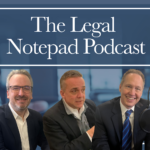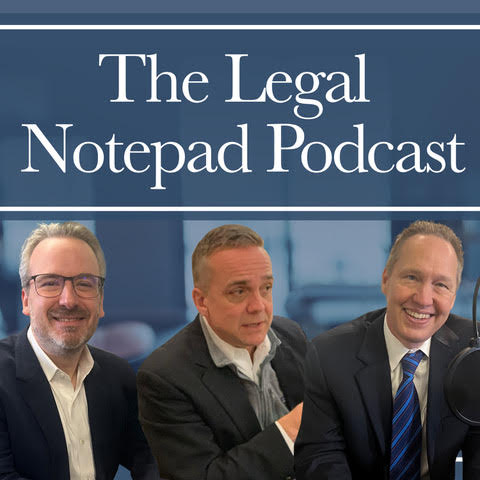Episode 5: Louisville attorneys Rob Mattingly and Kevin C. Burke focus today’s discussion on the change to unpublished opinions. They’ll explain when you can cite them and the proper way to cite them. Kevin recently presented on this topic at a Kentucky Justice Association event. They’re joined by Rob’s paralegal, Lauren Hincks.
Editor’s Note: If you are an attorney and would like CLE credit for this episode, visit the Kentucky Justice Association website, click the Education and Training tab and look for the podcast.

TODAY’S LEGAL QUESTION:
What is the New Rule on Unpublished Opinions Relative to Kentucky Proceedings?
Citation to unpublished opinions comes up fairly often for Kentucky attorneys. The Kentucky Court of Appeals publishes a list of new opinions on Fridays. Kevin notes that most of these are listed as, “Not to be published.”
On 1/01/2023 a new set up appellate rules came out. These are referred to as the Rules of Appellate Procedure. Rule 41 (“Citation to Unpublished Opinions”) is the new, more specific rule on unpublished opinions. This replaces rule CR76284(C). Kevin notes Rule 41a specifically addresses unpublished, Kentucky opinions.
Rule 41(A)
According to the new rule, unpublished Kentucky opinions are not binding precedent and citations of these opinions is disfavored. However, as stated in the section, a party may cite to and rely on a not-to-be-published for consideration if there are certain conditions met.
Condition 1: The unpublished opinion from the Kentucky Supreme Court or Court of Appeals was rendered after 01/01/2003. Unpublished opinion issued prior to this date cannot be cited.
Condition 2: The unpublished opinion is final under Rule 40(G).
Condition 3: There is no published opinion by the Kentucky Supreme Court or the Court of Appeals that would adequately address the point of law argued by the party. In other words, you have to rely on the binding precedent.
Condition 4: If you’ve met the above 3 conditions, you still need to tell the Court, “This opinion is not binding authority.”
Rule 41(B)
This deals with unpublished opinions that are not from Kentucky. Unpublished opinions from other jurisdictions are not binding precedents. Citations of these unpublished opinions are disfavored.
While the previously mentioned statement in Condition 4 (above) is not specifically mentioned, both Rob and Kevin agree it would be prudent to include, “This opinion is not binding authority.”
Rule 41(C)
This section deals with citations and copies. Under the new 2023 law, you are no longer required to attach the unpublished opinion to your brief, assuming you cite to the them the proper way.
Rule 41(C)(1) when citing a not-to-be-published opinion of the Kentucky Appellate Courts, the party must provide the style, date and case number of the opinion. Kevin notes the rule provides a specific example of how to do this, properly.
Section C notwithstanding, Kevin suggests you should attach the opinion, especially if it’s particularly favorable. Rob concurs with the inclusion of the unpublished opinion.
The Rules of Appellate Procedure are meant to apply to all appeals. Kevin clarifies this would include the Court of Appeals, the Kentucky Supreme Court and Circuit Court (assuming you’re appealing a decision from a District Court).
Kevin advises that when citing an unpublished, non-Kentucky opinion, you are not required to attach these opinions to your brief. However, you are required to provide a URL or other identifier permitting easy access to the opinion on a publicly-available electronic database. The other option is to simply include a copy of the opinion(s).
Requirements in Non-Appellate Situations
Rob set up the example of briefs being written in Circuit Court, thus not necessarily as part of an appeal (i.e. Motion for Summary Judgement, Motion to Dismiss, etc.). Do the new rules apply in these situations?
Kevin recommends the 2023 rule be followed, even though it’s not required, in these situations. The caveat might be if you know something specific from your trial court judge. He/she may have a stated preference regarding citations, so use your best judgement.
Again, Kevin stresses following the rule and informing the judge the citation is not binding and/or not final, if that’s the situation.
How to Use a Decision Providing an Advantage Your Case?
Lauren provides an example of a scenario in which the briefs have already been filed. Recently, however, a new case came down that would be advantageous to the case. How should they use this new decision?
Kevin recommends that assuming the new decision complies with the rules, you may be able to rely on Rule 35.
Rule 35(A)
This rule deals with Recent Supplemental Authority. Even though you’ve already filed your brief, Rule 35(A) would allow you to cite the new opinion. It provides that a party may file a motion for leave to cite recent supplemental authority, if such authority was decided after that party’s final brief was filed. Such a motion shall attach the supplemental authority and in 250 words, or less (excluding captions, signature block and certificate of service), describe how the supplemental authority pertains to the appeal at hand. Other parties to the appeal may file a response with the same word limit.
Rule 35(B)
This focuses on a situation in which you simply missed an unpublished decision, while you were briefing. Importantly, this is a different standard than 35(A). It states, a party may file a motion for leave to cite supplemental authority decided before its final brief was filed, only for good caution. Such a motion shall attach the supplemental authority in 400 words or less. Describe how the supplemental authority pertains to the appeal at hand and why it was not cited in the party’s brief. Other parties to the appeal may file a response with the same word limit.
Rule 38(E)
Let’s transition to oral arguments and opinions. This rule applies to supplemental authority, when you have oral arguments scheduled in your appeal. Kevin estimates that 10-15% of the appeals are slated for oral arguments. Rule 38 specifically addresses a deadline associated with filing supplemental authority for the panel that’s hearing the oral arguments. This is covered by Rule 38(E).
The rule states, in cases set for oral arguments, a party shall file any motion under Rule 35 on supplemental authority for leave to file supplemental authority on oral argument not later than 10 days before oral arguments, unless good cause is shown for a later filing.
That’s a wrap on today’s discussion. We hope you found the discussion insightful. As always, we encourage you to share this episode with your colleagues.
If you’d like the case notes, please sent us an email request and we’ll be happy to email you the file including the cases, rules, etc.
You can follow our podcast on a variety of platforms including, Spotify, iHeartRadio, Amazon Music, Audible, Apple Podcasts and many more. Thanks for taking the time to listen.
For More Information about the Law Offices of DeCamillis and Mattingly, PLLC
Address: 138 S. Third Street, Louisville, KY 40202 (across from The Old Spaghetti Factory)
Phone: (502) 589-2822
Website: DeCamillisMattingly.com
To Contact Kevin Burke:
Website: BurkeNeal.com
Phone: (502) 709-9975
The Kentucky Bar Association Requires Us to State “This is an advertisement.”



